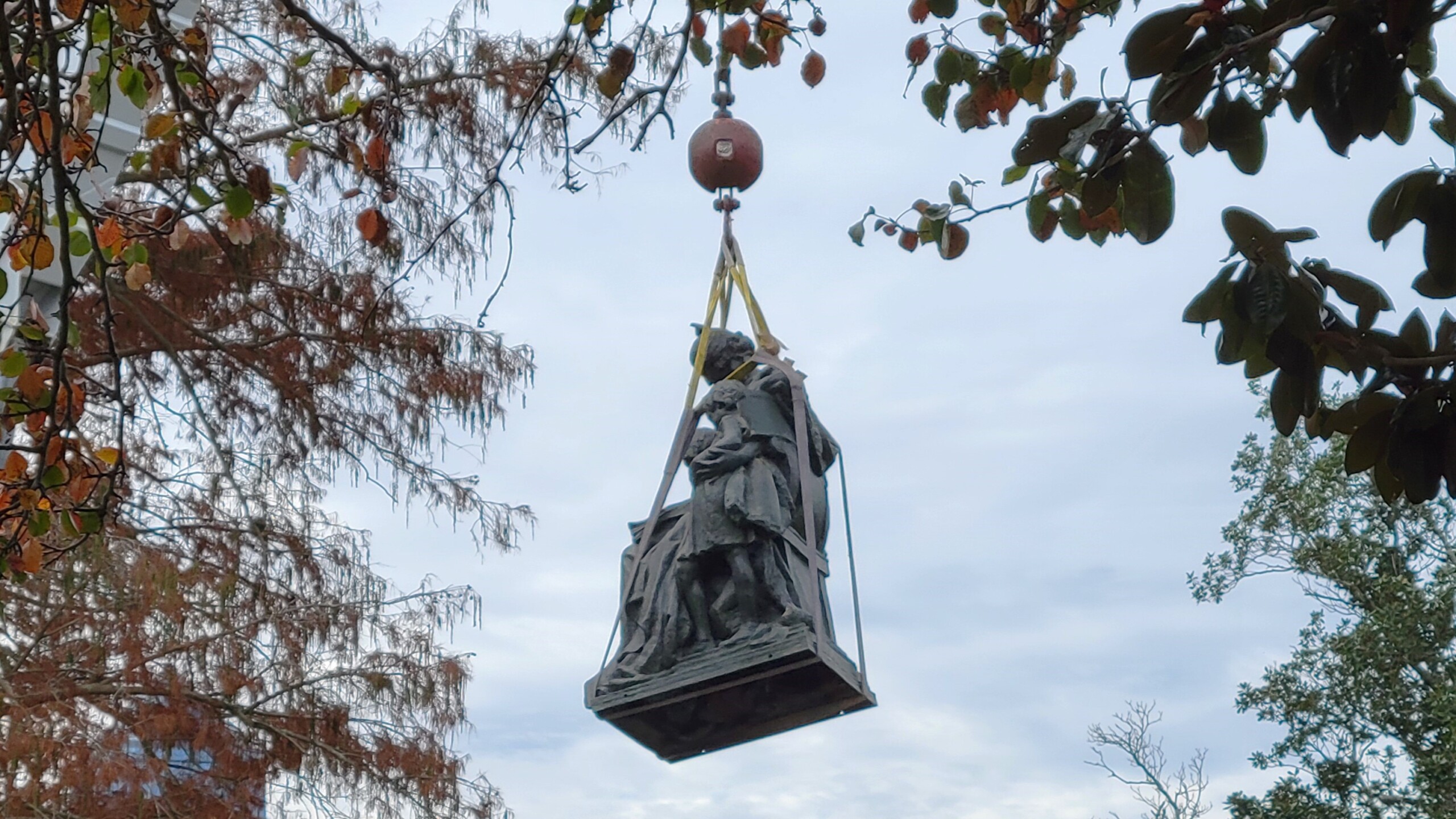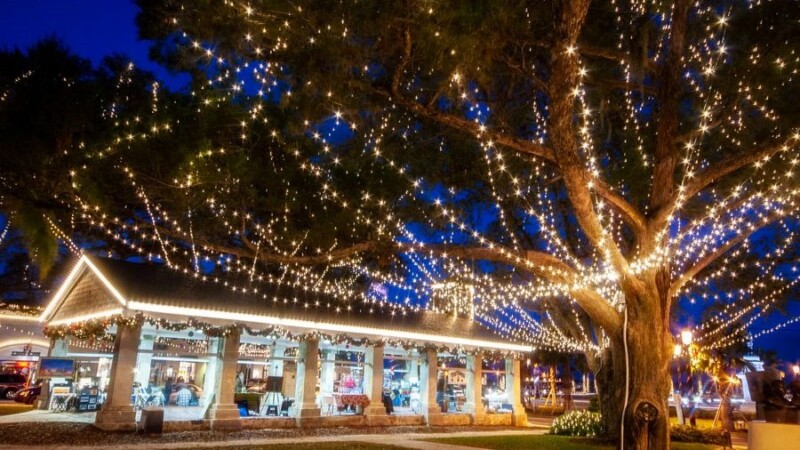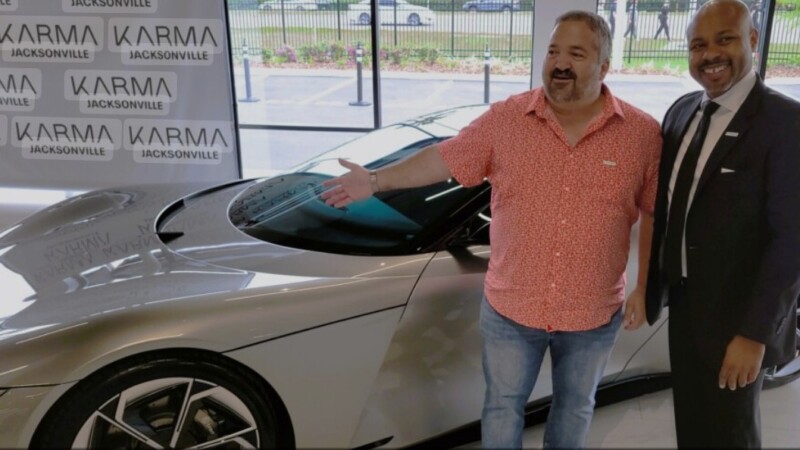The divisive statues that adorned the Confederate monument at Springfield Park were removed just after sunrise Wednesday as a crowd chanted “look what we can do” and “dump it in the river.”
About 50 people clustered along the fence that separated them from the 108-year-old “Tribute to the Women of the Southern Confederacy” as workers and a crane plucked the statues off their base and down to the ground.
Mayor Donna Deegan announced the action early Wednesday, saying: “Symbols matter. They tell the world what we stand for and what we aspire to be. By removing the Confederate monument from Springfield Park, we signal a belief in our shared humanity. That we are all created equal. The same flesh and bones. The same blood running through our veins. The same heart and soul.”
Deegan said the work was done with funding from the Jessie Ball duPont Fund and anonymous donors to 904WARD, an organization that promotes racial equity in Jacksonville. Engravings on the pedestal will be covered with temporary plaques. The cost of the work is $187,000 in an agreement between 904WARD and Acon Construction Co. of Jacksonville, Deegan said.
But the statutes’ removal did not eliminate the debate that has surrounded the issue for years.
Wells Todd, whose Take ‘Em Down Jax movement has fought to get the city to get rid of any Confederate monument, said the day felt like a victory.
“I think it took a long time, but when you are fighting for the truth, sometimes it takes a long time,” Todd said as he videoed the removal. “The whole community actually was part of this, not just Take ‘Em Down, but all the people out here who supported the removal of this Confederate monument.”
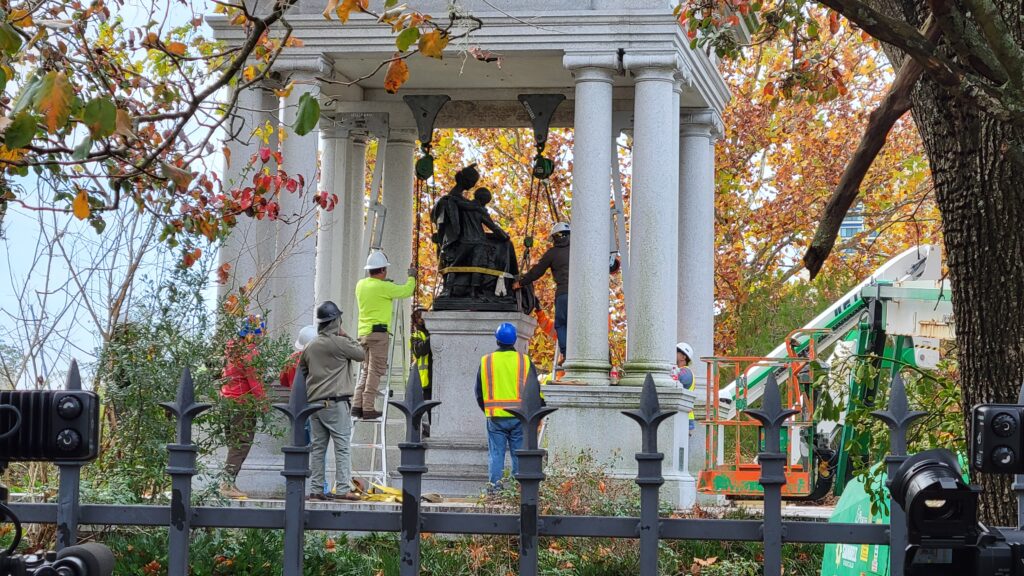
Likewise, Kelly Frazier’s late father, Ben, had spoken out loudly for the monument’s removal to the point of being arrested at a City Council meeting just over a year ago. He was president of the Northside Coalition of Jacksonville when he refused to stop speaking during a City Council meeting June 13. His daughter said she was ecstatic at what happened in front of her on Wednesday.
“This is really just a great day for Jacksonville,” said Kelly Frazier, now head of the community group her father founded. “I really thank Donna Deegan, our mayor, for doing what she said she would do by removing this statue, this racist monstrosity of a statue that glorified the Confederacy that needed to be removed so Jacksonville could go into a new day. My dad is not here with us physically, but he is here in spirit with us, watching this as it happens.”
But state Rep. Dean Black, a Jacksonville Republican, issued a news release calling the monument’s removal “a stunning abuse of power” by the mayor.
“This action, undertaken in the middle of the night, during the holidays, without consultation of city leaders or a vote by the council, is another in a long line of woke Democrats’ obsession with Cancel Culture and tearing down history,” Black said. “Choosing to erase our history is not ‘brave’ — it is a cowardly act done by a lawless mayor who hides under the cover of night.”
Black, who is chairman of the Duval Republican Party, filed a bill in November (HB 395) that would allow the state to fine or even remove a City Council member or mayor who takes down a historical monument. It will be considered when the 2024 legislative session starts Jan. 9.
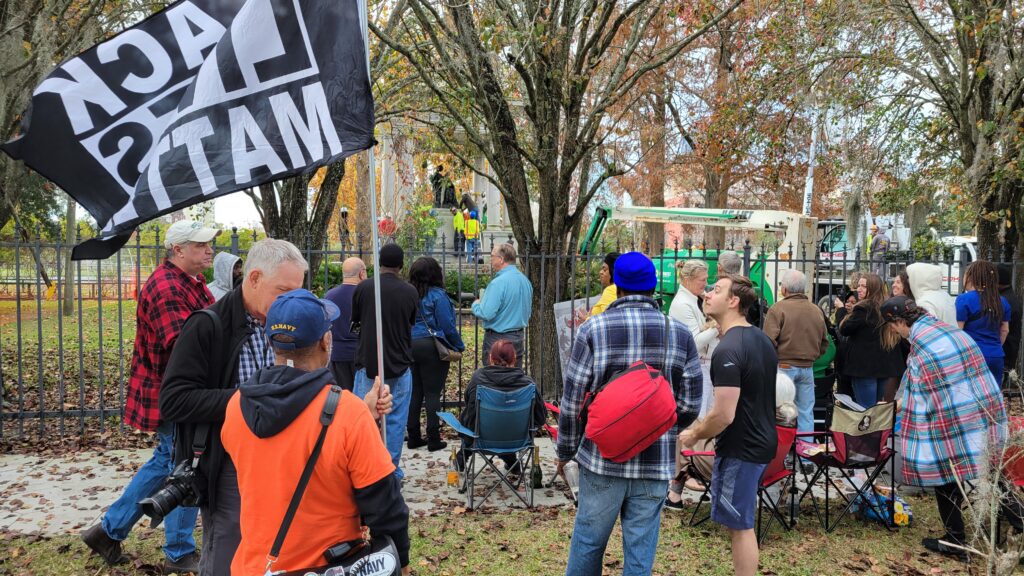
The large statue of a mother and child within the monument, and a smaller one of a woman holding a Confederate flag, were placed in what was then known as Confederate Park in 1915.
The monument’s opponents said it implicitly condoned an era of slavery and white supremacy. Deegan’s announcement Wednesday called the monument “part of a widespread campaign to promote and justify Jim Crow laws in the South and intimidate African Americans.”
Yet a large share of the community defended the monument as a relic of history that should be preserved. A poll from the University of North Florida in September found that 50% of respondents strongly or somewhat supported the removal of Confederate monuments from public lands, while 42% strongly or somewhat opposed it.
In an interview with Jacksonville Today, Deegan said the statues can remain in storage until the community has a discussion about what to do with them.
“They can stay stored for as long as they need to stay stored. They’re safe,” she said. “But if the community would like a conversation about moving them or next steps there, we’re happy to have that. … It may be that there’s a place for it on private property, if that’s a museum or some other place, that makes sense. But those will be discussions that we have to have as a community and perhaps with the City Council.
“I’m not saying that there’s not a historical place to put these, these artifacts or whatever you want to call them of our history. I just think in the middle of a Black neighborhood is not one of those places.”
Deegan said she has no delusions that removing the statutes will be universally popular.
“I’m not suggesting there won’t be anybody that’s unhappy with this. I’m sure there will be some,” she said. “But I think that that for those of us who are very much more focused on bringing this community together than we are on dividing it for political gain, those of us that really want that are going to work together to move the city forward in a way that that includes everybody. And I think that’s why this was so important.
“I think it’s important for bringing businesses to Jacksonville. I think it’s important for bringing people who want to move here to Jacksonville to say, hey, we’re not fighting the Civil War here anymore. We are here to include everybody. And I think we made a big step in that direction today.”
Deegan said she hopes removal of the monument is merely a first step in a broader discussion about unifying Jacksonville.
“If we don’t follow this with with great community conversations and the ability to have difficult discussions about the things that divide us, it’s only a step,” she said. “And it doesn’t go further than that. But I think it was an important step.”
Isaiah Rumlin, president of the Jacksonville Branch NAACP, made similar comments.
“While acknowledging Mayor Donna Deegan’s positive step in removing the monument, we emphasize that there is still much ground to cover,” Rumlin said in a news release. “The Jacksonville Branch NAACP, along with the National Office of the NAACP, stands united against all forms of hatred, racism and discrimination. As we navigate this journey towards a more inclusive and equitable Jacksonville, we are optimistic that our collective efforts will lead to a city that truly reflects the values of unity, respect and diversity.”
Cary Grant, a 76-year-old retired firefighter who grew up in Springfield, was happy that the statutes are gone.
“This is a glorious day for me … just wish my homies that grew up in the neighborhood could be here with me and see this,” he said.
Former Mayor Lenny Curry promised the removal of all Confederate monuments in June 2020, when, amid nationwide racial justice protests, he ordered the overnight removal of a Confederate statue in what is now James Weldon Johnson Park. “The others in this city will be removed as well,” he said at the time.
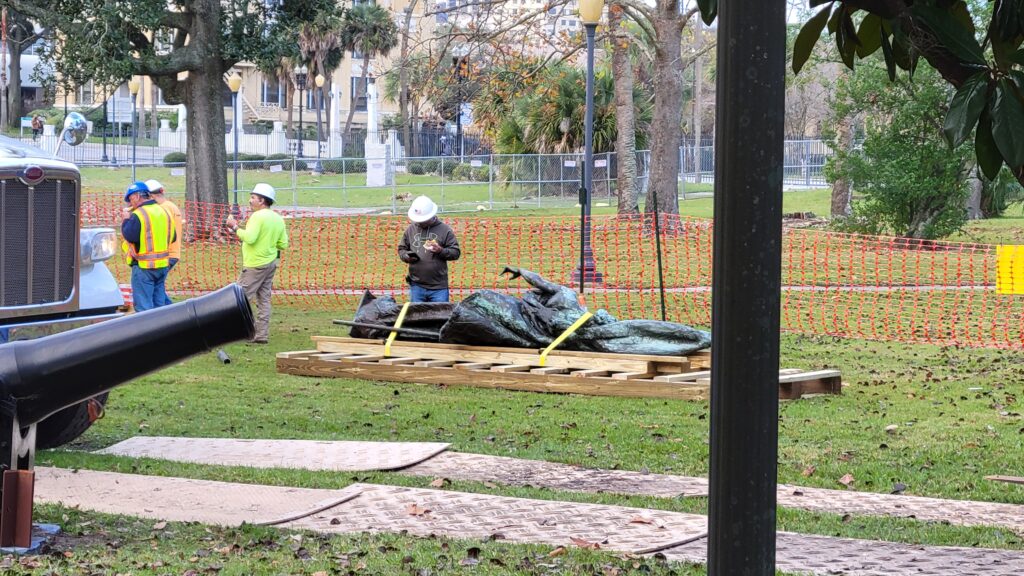
But the Jacksonville City Council decided repeatedly against removing the statutes. The council voted 12 to 6 in 2021 to withdraw a bill that would have allocated $1.3 million for the work. In June 2022, the council voted 13 to 6 against another bill proposing the removal. The same year, the council shot down a $500,000 plan to remove the monument and idled an offer from the Jessie Ball duPont Fund to hire outside facilitators to help the city determine the monument’s future on public lands.
The removal Wednesday cost far less because the statues’ base remains in place for now.
The removal prompted mixed reaction from City Council members.
City Councilman Ron Salem released a brief statement saying he recognizes the “complexities surrounding historical symbols.”
“While understanding the desire for change, it’s crucial to ensure open dialogue and legislative oversight in an effort to promote a unified approach to addressing historical artifacts,” Salem said. “I encourage constructive dialogue to address any concerns among my colleagues and to find a shared path forward.”
Fellow Councilman Nick Howland posted his objections on X, saying, “Deegan is our mayor, not our Monarch.” He called the removal of the monument “blatant overreach” that sidestepped City Council.
“This was the council’s decision to make,” Howland said. “Regardless of your opinion of the monument, this is abuse of power and disregard for transparency.”
Deegan disputed that she ordered the statutes removed under the cloak of darkness. She said equipment was moved into the park the day before and the work was carried out in full daylight. She said a quiet week was an opportune time to address the issue — considering what she considered a lack of movement by City Council.
“I spent a lot of time trying to determine if there was any interest from council to take this up right now,” she said. “There really wasn’t, and I get that.”
Black’s bill about historical monuments had no influence, she said, because she considers it unconstitutional. “I’m not overly concerned about that legislation,” she said.
City Councilman Jimmy Peluso, who was in the crowd as the statues were removed, said the voice of the people had been heard loud and clear at recent protests and in public comments to city lawmakers.
“We know, based on what I campaigned on and what the mayor campaigned on, that the public wanted this to go,” Peluso said. “We have seen public polling say something similar, so this is a great day. This is a day for healing. This is the first step in many steps to help bridge the divide and make sure everyone in this community feels that their city represents them.”
Deegan’s statement said the Office of General Counsel reviewed the mayor’s executive authority and found that because of the separation of powers, City Council approval was unnecessary to remove the monument, since city funds were not being used for the work.
But David McCallister, spokesman for Save Southern Heritage Inc., disagreed when contacted Wednesday. The Tampa-based group flew a pro-Confederate banner over TIAA Bank Field prior to a Jaguars game 13 months ago, then another with a Confederate flag and the phrase “Curry, Stop Your Hate!” over Downtown a year ago.
McCallister was surprised to learn that the mayor had authorized the statues’ removal and believes it should have gone to City Council for approval.
“It’s a shame that they have not planned ahead for what to do with this memorial, and basically it’s just a shame that Jacksonville will come to regret losing a public memorial to the courage and sacrifice of women during wartime,” he said. “It is cancel culture, iconoclasm at its worst. And the mayor is really aiding and abetting this in an illegal manner, in my opinion. … She has exceeded her authority.”
McCallister also was concerned about potential damage to the century-old statues, and he hopes an expert can inspect them. He said it is too soon to decide what response Save Southern Heritage’s members would have over the removal.
The group calls itself a voluntary association of people who “revere the South, Southern history and Southern heritage.”
Lead image: The statue of a mother and child honoring “The Women of our Southland 1861-1865” hangs from a crane Wednesday, Dec. 27, 2023, after its removal from a monument in
Springfield Park. | Dan Scanlan, WJCT News 89.9


